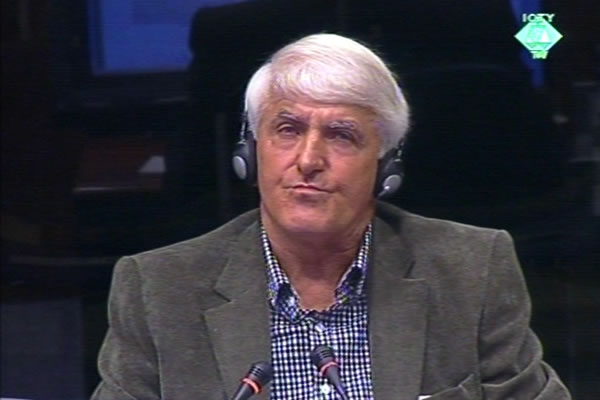Home
JUDGES ADMONISH BOTH THE ACCUSED AND WITNESS
In the cross-examination of Mehmed Music, the accused Karadzic tried to prove that before the Serb forces attacked the village of Musici, the villagers had armed themselves and made preparations for the fight – this is why they evacuated their women and children. The witness told Karadzic, ‘if you continue like that’, in the end it would turn out that the villagers of Musici had ‘tanks and canons’ at their disposal. The judges admonished both the accused and the witness against making ‘inappropriate’ and “unnecessary” comments
 Mehmed Music, witness at the Radovan Karadzic trial
Mehmed Music, witness at the Radovan Karadzic trial In 1992, Mehmed Music, now testifying as a prosecution witness at the trial of former Republika Srpska president Radovan Karadzic, lived in the village of Musici in the Sarajevo municipality of Hadzici. Music has given a series of statements to the OTP in The Hague and to the prosecution in Bosnia and Herzegovina. Music also testified against Momcilo Krajisnik and Slobodan Milosevic. Today the witness’s consolidated written statement was admitted into evidence and its short summary was read out in the courtroom.
As Music recounted, the Serb forces attacked his village on 20 May 1992. Three people were killed in the attack and about 150 were detained. In the five months that followed, Music went through seven detention facilities mentioned in the indictment against Karadzic. In those facilities ‘prisoners were abused, beaten up and humiliated’. In the garage in Hadzici, prisoners were forced to load ammunition, Music said. In the sports hall in Hadzici prisoners had to sing Chetnik songs and perform oral sex on other prisoners. Music also said that 48 prisoners were taken out of the sports hall and were never seen again. The witness was exchanged on 5 November 1992.
In the cross-examination, the witness and the accused clashed frequently; Music called Karadzic a ‘criminal’, an ‘extremist’ and a ‘liar’. Karadzic retorted by describing Music as ‘the favorite witness of all prosecutions, in The Hague and in Sarajevo’ and repeated this allegation several times. This exchange prompted presiding judge Kwon to warn Karadzic that his microphone would be turned off next time. Judge Morrison criticized the witness for making ‘unnecessary’ comments.
Karadzic tried to catch the witness out and show up his inconsistency by comparing the various statements the witness gave in past 15 years. Karadzic noted that in a recent statement Music says that the prisoners in the Hadzici sports hall were forced to perform oral sex on each other. Music replied that he ‘was ashamed’ to speak out about it and ‘this made me keep quiet about some things’. The accused noted that ‘some elements are repeated in the witnesses’ statements and in all detention centers’. From Iraq to Hadzici, there always seems to be someone who plays with the prisoners’ sexual organs’, Karadzic noted.
Karadzic also tried to prove that Bosniaks initiated the fighting and provoked the Serb forces into responding. To illustrate his claim, Karadzic quoted at length from the witness’s statements, where Music claimed that the villagers in Musici had rifles and pistols, adding later that they received ‘some weapons’, including a machine gun, from the reserve police, and they had carbines and hand grenades. ‘If you continue like that’, the witness retorted brusquely, it would turn out in the end that the villagers of Musici had ‘tanks and cannons’. Karadzic tried to find out why the villagers of Musici evacuated their women and children, and put it to the witness that the villagers ‘were killed in combat’. The witness replied that it was ‘fighting of sorts’ because they ‘fired from a machine gun until it got stuck’ but ‘we couldn’t fight against 50 tanks’.
After Music completed his evidence, Nedjeljko Prstojevic, former president of the Ilidza municipality, took the stand. The witness made a number of corrections in the statement he had given at the trial of Momcilo Krajisnik, and asked to be given the opportunity to provide additional explanations regarding some terms and documents. This prompted the judges to go against the prosecution’s objections and to decide that Prstojevic should testify viva voce, rather than through his written statement and the transcripts from his previous evidence. Prstojevic will continue his testimony on Tuesday.
Linked Reports
- Case : Karadzic
- 2011-03-02 WHOSE HOUSES WERE TO BE BLOWN UP?
- 2011-03-01 KARADZIC: PROSECUTION WITNESS AS ‘EXTREMIST’
- 2011-02-28 WITNESS WISHES KARADZIC HAPPY INDEPENDENCE DAY
- 2011-03-09 CLIMATE OF FEAR AND TERROR IN SARAJEVO
- 2011-03-10 RAPE UNSUITABLE FOR POLICE REPORT
- 2011-03-11 RAPE VICTIM: I WILL WAIT PATIENTLY FOR JUSTICE
